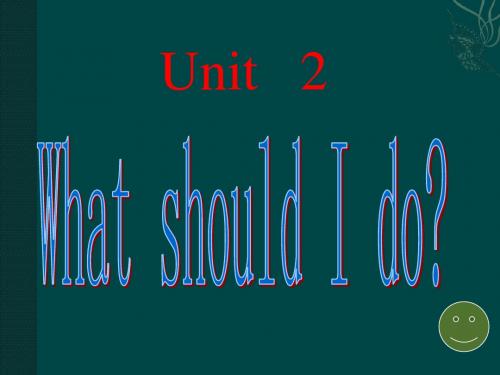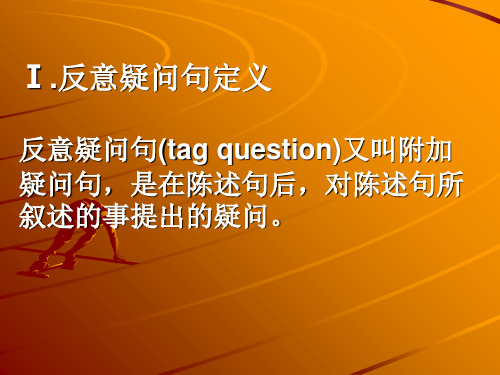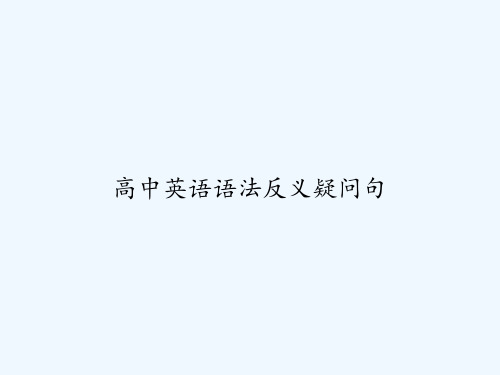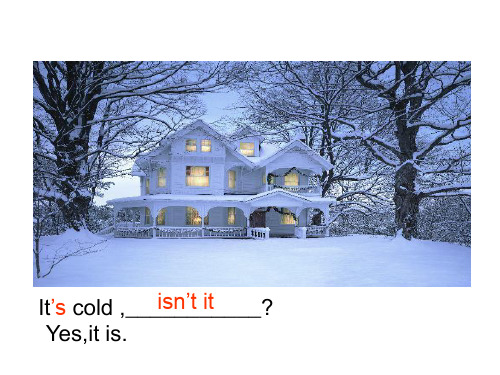反义疑问句PPT
合集下载
反义疑问句PPT

下列情况用此句式: 下列情况用此句式: 当谓语动词是否定形式时。 ①当谓语动词是否定形式时。 当陈述部分有no, never, little, ②当陈述部分有 seldom,hardly, scarcely, few, , nothing, nobody等否定或半否定词时。 等否定或半否定词时。 等否定或半否定词时
3) 关于陈述部分的主语和疑问部 分的主语一致问题
Everybody agrees with him,
don’t they/doesn’t he _______________ ? 陈述部分的主语如果是somebody, 陈述部分的主语如果是 someone, everybody, everyone, anybody, anyone, nobody, no-one, none, neither时,疑问部分 时 的主语用they或者 ,但多用 或者he,但多用they。 的主语用 或者 。Biblioteka 3) 主从复合句式反意疑问句
does he I don’t suppose he cares, _____ ? You don’t know where the meeting do you will be held, ______ ? I believe they’ve finished their haven’t they work, ________ ?
You’d better go there at instead of me___________ ? hadn’t you He’d rather not go there tomorrow________? would he He would like to go there today,_________ ? doesn’t he
完整反义疑问句课件

如果陈述句是肯定的,反义疑问句应该是否定的。
2 人称一致
陈述句和反义疑问句中的主语和动词人称要保持一致。,避免使用复杂的句子结构。
结束语
通过学习反义疑问句的结构和用法,我们可以更好地理解和运用这个表达方 式,提升我们的语言表达能力。
完整反义疑问句PPT课件
PPT介绍反义疑问句
什么是反义疑问句?
反义疑问句是指一种用于提问或表示疑问的句子结构,通常由一个陈述句和一个反义疑问句构成。
反义疑问句的结构
1
陈述句部分
包含陈述句的主谓宾结构
2
反义疑问句部分
由一个助动词和一个否定词构成
3
连接词
连接陈述句和反义疑问句的部分,常用的连接词包括but和yet
反义疑问句的语气和语调
语气
反义疑问句通常用于表示疑问、请求或强调某 种认可的语气。
语调
反义疑问句通常以升调结尾,以引起对方的回 答或注意。
反义疑问句的用法与例句
询问意见
这个计划听起来很好,不是吗?
表示认可
你很喜欢这部电影,对吗?
确认信息
你不会去参加聚会,对吗?
反义疑问句的注意事项
1 肯定陈述,否定反义疑问
2 人称一致
陈述句和反义疑问句中的主语和动词人称要保持一致。,避免使用复杂的句子结构。
结束语
通过学习反义疑问句的结构和用法,我们可以更好地理解和运用这个表达方 式,提升我们的语言表达能力。
完整反义疑问句PPT课件
PPT介绍反义疑问句
什么是反义疑问句?
反义疑问句是指一种用于提问或表示疑问的句子结构,通常由一个陈述句和一个反义疑问句构成。
反义疑问句的结构
1
陈述句部分
包含陈述句的主谓宾结构
2
反义疑问句部分
由一个助动词和一个否定词构成
3
连接词
连接陈述句和反义疑问句的部分,常用的连接词包括but和yet
反义疑问句的语气和语调
语气
反义疑问句通常用于表示疑问、请求或强调某 种认可的语气。
语调
反义疑问句通常以升调结尾,以引起对方的回 答或注意。
反义疑问句的用法与例句
询问意见
这个计划听起来很好,不是吗?
表示认可
你很喜欢这部电影,对吗?
确认信息
你不会去参加聚会,对吗?
反义疑问句的注意事项
1 肯定陈述,否定反义疑问
新概念英语第三册反义疑问句课件

It must have rained last night, did’t it?
昨晚一定下雨了,是吗?
②主语+must have done, haven’t +主语?
(无明显过去的时间)
It must have rained, hasn’t it?
一定下雨了,是吗?
特别注意(2):ought to
There is a cup on the table, isn’t there?
桌上有一个杯子,不是吗,不是吗?
3.陈述部分主语为指示代词,疑问部分主语用it/they
This is a book, isn’t it?
this/that→it
这是一本书,不是吗?
These are your friends , aren’t they?
(be动词与主语保持一致)
He must be an actor, isn’t he?
他一定是个演员,不是吗? They must be friends, aren’t they? 他们一定是朋友,不是吗?
2.对过去的推测
①主语+must have done, didn’t +主语? (有明显过去的时间)
这谁也不怨,对不对?
Everyone is having a good time, aren’t they?
每个人都玩的很开心,不是吗?
5.陈述部分主语为复合不定代词(物)疑问部分主语 用it.
Everything is ready. Isn’t it ?
一切都准备好了。是吗?
something, anything,nothing, everything等
陈述部分ought to,疑问部分 should’t/oughtn’t He ought to know what to do, oughtn’t/shouldn’t he? 他应该知道该做什么,不是吗?
昨晚一定下雨了,是吗?
②主语+must have done, haven’t +主语?
(无明显过去的时间)
It must have rained, hasn’t it?
一定下雨了,是吗?
特别注意(2):ought to
There is a cup on the table, isn’t there?
桌上有一个杯子,不是吗,不是吗?
3.陈述部分主语为指示代词,疑问部分主语用it/they
This is a book, isn’t it?
this/that→it
这是一本书,不是吗?
These are your friends , aren’t they?
(be动词与主语保持一致)
He must be an actor, isn’t he?
他一定是个演员,不是吗? They must be friends, aren’t they? 他们一定是朋友,不是吗?
2.对过去的推测
①主语+must have done, didn’t +主语? (有明显过去的时间)
这谁也不怨,对不对?
Everyone is having a good time, aren’t they?
每个人都玩的很开心,不是吗?
5.陈述部分主语为复合不定代词(物)疑问部分主语 用it.
Everything is ready. Isn’t it ?
一切都准备好了。是吗?
something, anything,nothing, everything等
陈述部分ought to,疑问部分 should’t/oughtn’t He ought to know what to do, oughtn’t/shouldn’t he? 他应该知道该做什么,不是吗?
反义疑问句语法课件

Maybe he is John’s father. 也许他是约翰的父亲。
He may be a student. 也许他是一名学生。 4. call up…表示“打电话…”可以与名词、代词连用。连接代词 时,把代词放在call与up之间。 Please call me up. Don’t forget to call up your uncle.
4. Maybe you could go to his house.
5. You could give him a ticket to a ball game.
d. I don’t like writing letters.
e. I don’t want to talk about it on the phone.
Homework:
Lily argued with her mother today.
What should she do? Give her advice as much as you can.
句型转换
1.You should write him a letter.(否定句) should _______write not You ______ him a letter. 2.He could borrow books from the library.(疑问句) Could _____ he borrow books from the library? ______ 3.His parents are out of style.(画线提问) What’s wrong ______ with his parents ? ______ ______ 4. My parents bought a bike for me.(同义句) me ____ a bike My parents bought _____ ______. 5. He came to school late because the street was too crowed.(画线提问) Why _____ did he ______ come to school? _______
反义疑问句归纳总结.ppt

The Swede made no answer, did he / she? Some plants never blown, do they ?
There are few apples in the basket, are there?
He can hardly swim, can he?
They seldom come late, do they?
He is not the man who gave us a talk, is he? He said he wanted to visit Japan, didn't he?
c. 上述部分主句谓语是I ;we think, believe, expect, suppose, imagine 等引 导的宾语从句,疑问部分与宾语从句相 对应构成反意疑问句。
to you in English, does she? She rarely speaks
4)含有ought to 的反意疑问句,陈述 部分是肯定的,疑问部分用shouldn't / oughtn't +主语。
He ought to know what to do, oughtn't he? / shouldn't he?
Either you or he is right,_is_n_’_t_h_e_?
13)陈述部分主语是指示代词或不定代 词 everything, that, this nothing, 疑问 部分主语用 it 。
Everything is ready, isn't it?
14)陈述部分为主语从句或并列复合句, 疑问部分有三种情况s Mr. Smith had been to Beijing for several times, he should have been in China now, shouldn't he?
There are few apples in the basket, are there?
He can hardly swim, can he?
They seldom come late, do they?
He is not the man who gave us a talk, is he? He said he wanted to visit Japan, didn't he?
c. 上述部分主句谓语是I ;we think, believe, expect, suppose, imagine 等引 导的宾语从句,疑问部分与宾语从句相 对应构成反意疑问句。
to you in English, does she? She rarely speaks
4)含有ought to 的反意疑问句,陈述 部分是肯定的,疑问部分用shouldn't / oughtn't +主语。
He ought to know what to do, oughtn't he? / shouldn't he?
Either you or he is right,_is_n_’_t_h_e_?
13)陈述部分主语是指示代词或不定代 词 everything, that, this nothing, 疑问 部分主语用 it 。
Everything is ready, isn't it?
14)陈述部分为主语从句或并列复合句, 疑问部分有三种情况s Mr. Smith had been to Beijing for several times, he should have been in China now, shouldn't he?
反义疑问句详细讲解课件(PPT27张)

I don’t believe he has finished his work.
7.当陈述部分的主句是I think (expect, believe)等结构时,反 意疑问句的附加部分则往往与从 句中的主语和谓语动词保持对应 关系,但要注意否定的转移。 例如:
I think he’s funny, isn’t he? I don’t believe she likes my
You must have seen the film last week, didn’t you?
6. 当陈述部分是I am…时,反意疑 问句部分通常要用aren’t I;如陈述 句部分的主语是I am not时,反意疑 问句部分通常要用am I。 例如:
1)I am a teacher, aren’t I?
Ⅰ.反意疑问句定义
反意疑问句(tag question)又叫附加 疑问句,是在陈述句后,对陈述句所 叙述的事提出的疑问。
Ⅱ.基本结构:
陈述句+逗号+简短的一般疑问句?
遵循前肯定后否定前否后肯式的原则
①前肯后否式。例如:
You are all students, aren’t you﹖
②前否后肯式。例如:
Let’s have a rest, shall we? 以let us开头的祈使句,不包括 说话人在内,因此反意疑问句的 附加部分用will you。例如:
Let us stop now, will you?
Ⅳ. 反意疑问句的回答 “ 根据事实回答”
对反意疑问句的回答,无论问题的提法如何,如果 事实是肯定的,就用yes,事实是否定的,就要用no。 要特别注意陈述句部分是否定结构,反意疑问句部分 用肯定式提问时,回答yes或no与汉语正好相反。这 种省略回答的yes要译成“不”,no要译成“是”。
7.当陈述部分的主句是I think (expect, believe)等结构时,反 意疑问句的附加部分则往往与从 句中的主语和谓语动词保持对应 关系,但要注意否定的转移。 例如:
I think he’s funny, isn’t he? I don’t believe she likes my
You must have seen the film last week, didn’t you?
6. 当陈述部分是I am…时,反意疑 问句部分通常要用aren’t I;如陈述 句部分的主语是I am not时,反意疑 问句部分通常要用am I。 例如:
1)I am a teacher, aren’t I?
Ⅰ.反意疑问句定义
反意疑问句(tag question)又叫附加 疑问句,是在陈述句后,对陈述句所 叙述的事提出的疑问。
Ⅱ.基本结构:
陈述句+逗号+简短的一般疑问句?
遵循前肯定后否定前否后肯式的原则
①前肯后否式。例如:
You are all students, aren’t you﹖
②前否后肯式。例如:
Let’s have a rest, shall we? 以let us开头的祈使句,不包括 说话人在内,因此反意疑问句的 附加部分用will you。例如:
Let us stop now, will you?
Ⅳ. 反意疑问句的回答 “ 根据事实回答”
对反意疑问句的回答,无论问题的提法如何,如果 事实是肯定的,就用yes,事实是否定的,就要用no。 要特别注意陈述句部分是否定结构,反意疑问句部分 用肯定式提问时,回答yes或no与汉语正好相反。这 种省略回答的yes要译成“不”,no要译成“是”。
完整反义疑问句课件

04
反义疑问句的回答
肯定回答
要点一
肯定回答时,通常使用“Yes”来 回答反义疑问句,并重复…
You like apples, don’t you? 回答:Yes, I do.
要点二
如果对反义疑问句中的否定部分 进行强调,可以使用“Yes…
You didn’t go to the party, did you? 回答:Yes, I did.
详细描述
反义疑问句是一种常见的语法结构,通常用于表达说话者的 态度、观点或对某件事情的疑问。它的特点是前半部分是一 个肯定或否定的陈述句,而后半部分则通过疑问的形式表达 相反的意思。
类型
总结词
反义疑问句可以分为两种类型,即标准反义疑问句和非标准反义疑问句。
详细描述
标准反义疑问句的前半部分是一个肯定句,后半部分是一个否定疑问句;或者 前半部分是一个否定句,后半部分是一个肯定疑问句。而非标准反义疑问句则 不遵循这一规则,前后两部分没有明显的相反意思。
总结词
表示某些特殊情况或特殊用法,需要特 别注意。
VS
详细描述
在某些特殊情况下,反义疑问句的用法可 能会发生变化。例如,当陈述句为祈使句 时,反义疑问句通常会省略主语;当陈述 句为感叹句时,反义疑问句通常会省略疑 问词。此外,还有一些特殊的反义疑问句 结构,如“他不是学生吗?”等,需要特 别注意其用法和含义。
否定回答
要点一
否定回答时,可以使用“No”来 回答反义疑问句,并重复疑…
You don’t like coffee, do you? 回答:No, I don’t.
要点二
如果对反义疑问句中的肯定部分 进行强调,可以使用“No,…
You went to the concert, didn’t you? 回答:No, I didn’t.
反义疑问句(共14张PPT)全

二、前否+后肯
1.She wasn’t ill last week, was she ? 2.It doesn’t often rain here, does it? 3.Tom won’t go to Shanghai next year,
will he ?
特殊用法1—祈使句的反义疑问句
1、肯定祈使句的反意疑问句,疑问部分用will you或won’t you,否定祈使句则用will you ? 如: Don't do that again, will you? Go with me, will you / won't you?
13、He who seize the right moment, is the right man.谁把握机遇,谁就心想事成。2024/10/172024/10/172024/10/172024/10/1710/17/2024 +14、谁要是自己还没有发展培养和教育好,他就不能发展培养和教育别人。2024年10月17日星期四2024/10/172024/10/172024/10/17 +15、一年之计,莫如树谷;十年之计,莫如树木;终身之计,莫如树人。2024年10月2024/10/172024/10/172024/10/1710/17/2024 +16、教学的目的是培养学生自己学习,自己研究,用自己的头脑来想,用自己的眼睛看,用自己的手来做这种精神。2024/10/172024/10/17October 17, 2024 +17、儿童是中心,教育的措施便围绕他们而组织起来。2024/10/172024/10/172024/10/172024/10/17
一 、前肯+后否 含be动词
1.He is a doctor, isn’t he? 2.I am Chinese, aren’t I?
高中英语语法反义疑问句-PPT

It is a fine day. Let’s go fishing, _sh_a_l_l_w_e_? Let us do this job,_w_i_ll_y_o_u_?
Turn on thewrialdl iyoo,u__/w__o_n_’t_?you
24
16)陈述部分是“there be”结构 时:
6
2)陈述部分用 no, nothing, nobody, never, few, seldom, hardly, rarely, little等否定含义 的词时,疑问部分用肯定含义。
The Swede made no answer, did he / she? Some plants never blown (开花 ), do they ?
He would rather read it ten times than recite it, wouldn't he?
13
8)陈述部分有You'd like to + v. 疑问部分用wouldn't +主语。
You’d like to go with me, wouldn't you?
14
9)must表示“推测”时,如何确
定反意疑问句?
He must be a doctor, isn't he?
He must like physics, doesn't
he?
You must have studied English,
haven't you?
He must have finished it
17)否定前缀不能视为否定词, 其反意疑问句仍用否定形式。
It is impossible, isn't it?
英语语法反义疑问句ppt

祈使句的反意疑问句
肯定的祈使句:won’t you ? / will you ? 祈使句的反意疑问句
否定的祈使句:will you ? 注:Let’s … , shall we?
Let us…, will you? e.g. Let us go to watch the movie, will you ? Let’s walk to the shops instead of taking the car, shall we ? Don't play computer games, will you?
B. is she
C. did she C. hasn’t he C. did she C. don’t they C. hasn’t she
D. wasn’t she D. doesn’t he D. didn’t she D. will they D. has she
6. There won’t be any concert this Saturday evening, C ?
A. will there not
B. will there C. is there
D. won’t there
7. He dislikes the two subjects, B he?
A. does
B. doesn’t
C. is
8. Let’s go there by bus, B ?
D. isn’t
特殊的反意疑问句
特殊的反意疑问句: (1) 主+ used to do sth, didn't/usedn't+主?
She used to get up at 7 o'clock, didn't/usedn't she ?
初中反义疑问句PPT课件

18
He was hardly twelve then, was he ? 那时他还不到12岁吧,对吗?
.
19
1. Linda went to the zoo three times last year ,__d_id_n_’_t_s_h_e_?
2.This is your sister,___i_s_n_’t_s_h_e______?
.
10
3. 情态动词(can, will)的反意疑问句
主语+can/will …, can’t /won’t + 主语?
1 Tom can swim very well, _c_a_n__’t_h_e___? 2 Your parents can’t swim, __c_a_n_t_h_e_y____? 3 All of your friends will come to your party, _w__o_n_’t_t_h_e_y__? 4 They won’t come,_w_i_ll_t_h_e_y__?
找错isnthecantyoudidnthe22hehasfewfriendsdoeshehaveneverbeen对反意疑问句的回答无论问题的提法如何如果事实是肯定的就用yes事实是否定的就要用要特别注意陈述句部分是否定结构反意疑问句部分用肯定式提问时回答yes或no与汉语正好相反
It’s cold ,___is_n_’_t _it____? Yes,it is.
about 2 years,_w_o_n_’_t_t_h_e_re_? 15 Open your books, __w__il_l _y_o_u____?
16 Don’t go across the road now, ___w_i_ll_y_o_u___?
反义疑问句(25张PPT)初中英语专项复习课件

Yes, they were.
【典例1】John had a short walk after lunch, _______?
A. did he
B. didn't he
C. had he
D. hadn't he
考查反义疑问句。反义疑问句遵循的原则为“前肯,后否;前否,后 肯”,得出疑问句部分为否定形式。陈述句部分为一般过去时,需用 助动词did来反问,故答案选B。
No, she hasn’t.
易错点2
常见时态的反义疑问句
一 般 过 去 时
She wasn’t at home, _w_a_s_s_h_e_? No, she wasn’t.
易错点2
常见时态的反义疑问句
一 般 过 去 时
They weren’t in the park last Sunday, _w_e_r_e_t_h_e_y_?
前肯 前否
后否 后肯
“是吗?” “是不是?” “这是真的吗?” “你同意吗?”
注意
附加疑问句= be、助动词、情态动词+人称代词主格
易错点1
反义疑问句的回答
Yes, 主语 + be动词/情态动词/助动词 No,主语 + be动词/情态动词/助动词 + not
易错点2
常见时态的反义疑问句
一 般 现 在 时
反义疑问句的特殊用法 祈使句的反义疑问句
反义疑问句的特殊用法
1
2
3
陈述句部分含 有否定意义的 词。
陈述部分主语
陈述部分是I am
或 I’m 。
是this, that ,
these, those时。 Nhomakorabea反义疑问句的特殊用法 1
【典例1】John had a short walk after lunch, _______?
A. did he
B. didn't he
C. had he
D. hadn't he
考查反义疑问句。反义疑问句遵循的原则为“前肯,后否;前否,后 肯”,得出疑问句部分为否定形式。陈述句部分为一般过去时,需用 助动词did来反问,故答案选B。
No, she hasn’t.
易错点2
常见时态的反义疑问句
一 般 过 去 时
She wasn’t at home, _w_a_s_s_h_e_? No, she wasn’t.
易错点2
常见时态的反义疑问句
一 般 过 去 时
They weren’t in the park last Sunday, _w_e_r_e_t_h_e_y_?
前肯 前否
后否 后肯
“是吗?” “是不是?” “这是真的吗?” “你同意吗?”
注意
附加疑问句= be、助动词、情态动词+人称代词主格
易错点1
反义疑问句的回答
Yes, 主语 + be动词/情态动词/助动词 No,主语 + be动词/情态动词/助动词 + not
易错点2
常见时态的反义疑问句
一 般 现 在 时
反义疑问句的特殊用法 祈使句的反义疑问句
反义疑问句的特殊用法
1
2
3
陈述句部分含 有否定意义的 词。
陈述部分主语
陈述部分是I am
或 I’m 。
是this, that ,
these, those时。 Nhomakorabea反义疑问句的特殊用法 1
初中反义疑问句PPT课件

.
7
三、反意疑问句的解答步骤
1. 判定(判断该用肯定还是否定); 2. 找动(找句子的助动词:be用be,动词原形do,三 单does,过去did,完成have); 3. 换代(将主语换为代词);
• Jack wasn’t playing soccer, _w__a_s _h_e___?
• Their parents have gone to London, __h_a_v_e_n_’_t t_h_e_y__?
现在 主语+is (are)…, isn’t (aren’t) + 主语? 过去 主语+was (were)…,wasn’t (weren’t) + 主语?
1 He is your uncle, _i_s_n_’t_h__e_____?
2 You are not students, __a_r_e_y_o_u_____?
5 They have never been to Hong Kong, __h_a_v_e__th_e_y_____?
.
12
5. There be 句型的反意疑问句
There is/are/will be…, isn’t/aren’t/won’t there?
1 There is a pen on the chair,__is_n_’t_t_h_e_re___?
3 The students are going to have a picnic,
__a_re_n_’_t _t_h_e_y___?
4 Kate isn’t from the USA, __is__s_h_e______?
5 He was German, _w_a_s_n_’_t_h_e____?
相关主题
- 1、下载文档前请自行甄别文档内容的完整性,平台不提供额外的编辑、内容补充、找答案等附加服务。
- 2、"仅部分预览"的文档,不可在线预览部分如存在完整性等问题,可反馈申请退款(可完整预览的文档不适用该条件!)。
- 3、如文档侵犯您的权益,请联系客服反馈,我们会尽快为您处理(人工客服工作时间:9:00-18:30)。
根据历届高考试题出题的特点,可以记住以下 规律:祈使句的反意疑问句,除Let’s开头的 句子以外,其他句子的疑问部分一律用will you 即可。
2021/3/9
8
3) 主从复合句式反意疑问句
I don’t suppose he cares, _d_o_es_h_e ? You don’t know where the meeting
注意:这样的句子如果主句是否定的, 疑问部分还是以从句为依据,且用肯定 形式。如果主句是肯定的,从句是否定 的,疑问部分自然是用肯定形式。如果 主语是其他人称,仍以主句为依据。
2021/3/9
11
I don’t think he is right, _i_s_h_e_____? I suppose that he isn’t right,_i_s_h_e_____? He thought that Tom was right,_d_id_n_’t_h_e_?
They had to leave, _di_d_n’_t _th_ey ?
He has to leave,_d_o_es_n’_t_he__? They have to leave,_d_o_n’_t _th_ey_? 陈述部分有have to,疑问部分多用do
的形式,也有用have的情况。
2021/3/9
15
I must save money, _n_e_ed_n_’t_I____?
He mustn’t park the car here,
_m_u_s_t h_e__?
陈述部分有must,如果must意为“必 须”,疑问部分用needn’t;如果含有 mustn’t意为“不允许,禁止”时, 疑问 部分用must。
2021/3/9
7
(4) Let us开头的祈使句,其疑问部分一般用 will you。
(5) Let me开头的祈使句,其疑问部分一般用 will you。
(6) Let him, Let the boy, Let them开头的 祈使句,其疑问部分一般用will you或won’t you。
will be held, _d_o_y_ou__ ? I believe they’ve finished their
work, _h_a_ve_n_’t_th_e_y ?
2021/3/9
9
You think I’m wrong, _d_o_n_’t_y_ou?
I believe they haven’t come, ha_v_e_th_e_y ?
2021/3/9
3
下列情况用此句式:
①当谓语动词是否定形式时。
②当陈述部分有no, never, little, seldom,hardly, scarcely, few, nothing, nobody等否定或半否定词时。
2021/3/9
4
注意:
e.g. It’s unfair, _i_sn_’_t _it__ ? She dislikes the idea, _d_o_es_n_’t_she ? 句中若有带否定意义的前缀或后缀的单
词,这个句子仍被视为肯定句。
2021/3/9
5
2) 祈使句式反意疑问句
e.g. Let’s go home, _s_h_a_ll_we ? Let us go, _w_i_ll_y_o_u ? Give me a hand, _w__ill_/_w_o_n_’t_you ?
Don’t sit here, _w_i_ll _yo_u____ ?
(1) 主从复合句式的反意疑问句的构成 一般以主句为判断依据。
2021/3/9
10
(2) 如果主句的主语是I, we, 谓语是 think, believe, suppose, expect, imagine, guess, say, hear, feel等, 后接宾语从句构成反意疑问句时,其疑 问部分一般以从句为依据。
2021/3/9
6
(1) 如果陈述部分是肯定的,疑问部分 可用肯定形式,也可用否定形式。一般 常用won’t表示邀请,用will, would, can, can’t表示告诉别人该做什么。
(2) 如果陈述部分是否定的,疑问部分 可用will you或can you。
(3) Let’s开头的祈使句,其疑问部分一 般用shall we。
2021/3/9
16
You must be tired , _ar_e_n’_t _yo_u___ ?
2021/3/9
12
4) 并列复句反意疑问句
We kept ringing the bell, but
nobody answered, _d_id_t_h_ey_/h_e____? He isn’t a diligent student, for it is
the third time that he has been late for school, _i_sn_’t_i_t ____?
Grammar
反义疑问句
2021/3/9
1
反意疑问句 Tag Question
有如下几种句式: 1)陈述句式反意疑问句 She likes the idea,__do_e_s_n_’t_she ? 陈述部分是肯定的,疑问部分是否定的。
2021/3/9
2
e.g. No tractors are working in the
fields, _a_re__th_e_y___ ?
They didn’t find any living things
there, _d_id__th_e_y_ ?
Little progress has been made,
_h_as_i_t ?
(2) 陈述部分是否定的, 疑问部分是肯定 的。即:前肯后否,前否后肯。
He is a teacher but his wife isn’t a
teacher, _is_s_he___接近的 分句的主、谓语保持一致。为了便于记 忆,我们称之为就近一致原则。
2021/3/9
14
重点掌握的要点
1) 带有情态动词的反意疑问句
2021/3/9
8
3) 主从复合句式反意疑问句
I don’t suppose he cares, _d_o_es_h_e ? You don’t know where the meeting
注意:这样的句子如果主句是否定的, 疑问部分还是以从句为依据,且用肯定 形式。如果主句是肯定的,从句是否定 的,疑问部分自然是用肯定形式。如果 主语是其他人称,仍以主句为依据。
2021/3/9
11
I don’t think he is right, _i_s_h_e_____? I suppose that he isn’t right,_i_s_h_e_____? He thought that Tom was right,_d_id_n_’t_h_e_?
They had to leave, _di_d_n’_t _th_ey ?
He has to leave,_d_o_es_n’_t_he__? They have to leave,_d_o_n’_t _th_ey_? 陈述部分有have to,疑问部分多用do
的形式,也有用have的情况。
2021/3/9
15
I must save money, _n_e_ed_n_’t_I____?
He mustn’t park the car here,
_m_u_s_t h_e__?
陈述部分有must,如果must意为“必 须”,疑问部分用needn’t;如果含有 mustn’t意为“不允许,禁止”时, 疑问 部分用must。
2021/3/9
7
(4) Let us开头的祈使句,其疑问部分一般用 will you。
(5) Let me开头的祈使句,其疑问部分一般用 will you。
(6) Let him, Let the boy, Let them开头的 祈使句,其疑问部分一般用will you或won’t you。
will be held, _d_o_y_ou__ ? I believe they’ve finished their
work, _h_a_ve_n_’t_th_e_y ?
2021/3/9
9
You think I’m wrong, _d_o_n_’t_y_ou?
I believe they haven’t come, ha_v_e_th_e_y ?
2021/3/9
3
下列情况用此句式:
①当谓语动词是否定形式时。
②当陈述部分有no, never, little, seldom,hardly, scarcely, few, nothing, nobody等否定或半否定词时。
2021/3/9
4
注意:
e.g. It’s unfair, _i_sn_’_t _it__ ? She dislikes the idea, _d_o_es_n_’t_she ? 句中若有带否定意义的前缀或后缀的单
词,这个句子仍被视为肯定句。
2021/3/9
5
2) 祈使句式反意疑问句
e.g. Let’s go home, _s_h_a_ll_we ? Let us go, _w_i_ll_y_o_u ? Give me a hand, _w__ill_/_w_o_n_’t_you ?
Don’t sit here, _w_i_ll _yo_u____ ?
(1) 主从复合句式的反意疑问句的构成 一般以主句为判断依据。
2021/3/9
10
(2) 如果主句的主语是I, we, 谓语是 think, believe, suppose, expect, imagine, guess, say, hear, feel等, 后接宾语从句构成反意疑问句时,其疑 问部分一般以从句为依据。
2021/3/9
6
(1) 如果陈述部分是肯定的,疑问部分 可用肯定形式,也可用否定形式。一般 常用won’t表示邀请,用will, would, can, can’t表示告诉别人该做什么。
(2) 如果陈述部分是否定的,疑问部分 可用will you或can you。
(3) Let’s开头的祈使句,其疑问部分一 般用shall we。
2021/3/9
16
You must be tired , _ar_e_n’_t _yo_u___ ?
2021/3/9
12
4) 并列复句反意疑问句
We kept ringing the bell, but
nobody answered, _d_id_t_h_ey_/h_e____? He isn’t a diligent student, for it is
the third time that he has been late for school, _i_sn_’t_i_t ____?
Grammar
反义疑问句
2021/3/9
1
反意疑问句 Tag Question
有如下几种句式: 1)陈述句式反意疑问句 She likes the idea,__do_e_s_n_’t_she ? 陈述部分是肯定的,疑问部分是否定的。
2021/3/9
2
e.g. No tractors are working in the
fields, _a_re__th_e_y___ ?
They didn’t find any living things
there, _d_id__th_e_y_ ?
Little progress has been made,
_h_as_i_t ?
(2) 陈述部分是否定的, 疑问部分是肯定 的。即:前肯后否,前否后肯。
He is a teacher but his wife isn’t a
teacher, _is_s_he___接近的 分句的主、谓语保持一致。为了便于记 忆,我们称之为就近一致原则。
2021/3/9
14
重点掌握的要点
1) 带有情态动词的反意疑问句
